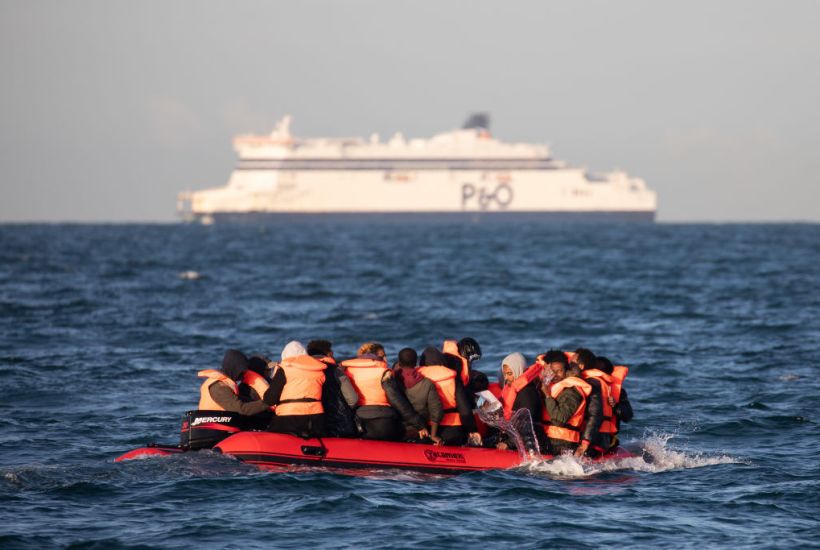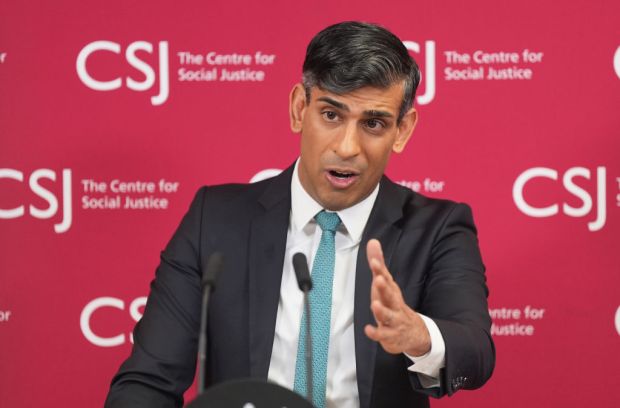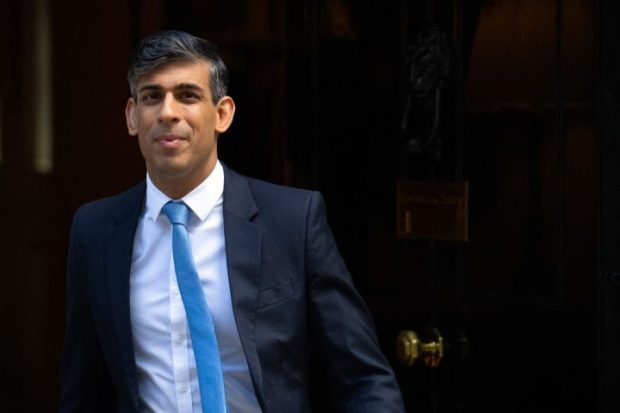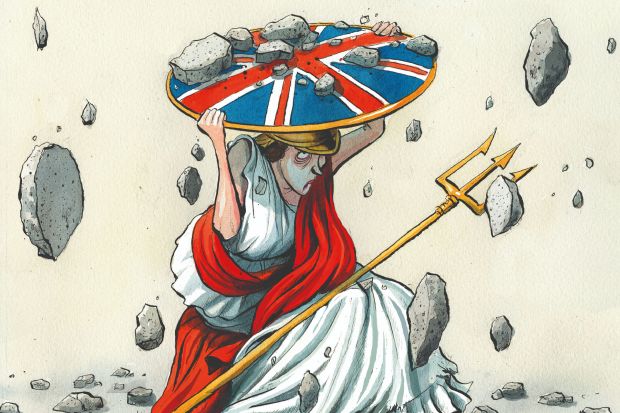Britain has lost control of its borders. Over the last four years, the number of asylum-seekers and illegal migrants who have arrived unlawfully in Britain in small boats, after passing through safe countries, has rocketed from just 299 to nearly 40,000.
This year, so far, the number of people crossing the Channel each month has surged from 1,000 back in January to more than 7,000 in September. Last week, nearly 1,000 people in 24 boats crossed the Channel in a single day.
Make no mistake. Many of the people who are making this perilous journey are genuine refugees fleeing war and persecution — including conflicts that were started by hapless western leaders. The data show that the people on the boats are primarily from Afghanistan, Iran, Iraq, Syria, Eritrea and Sudan.
But it is also true that many are not genuine refugees. The most remarkable statistic to emerge this week is that up to 2 per cent of the entire adult male population of Albania have now come to Britain on the small boats. There is no war in Albania. There is no persecution. The country is not only a signatory of modern slavery legislation but is also in formal talks to join the European Union.
Nonetheless, helped by a well-organised and dangerous Albanian mafia, which has established a strong foothold in northern France, some 12,000 mainly young Albanian men have crossed illegally into Britain this year alone. Contrary to all those people who only a few months ago said that the number of Albanians was being exaggerated, they are now the largest single group on the boats.
Here is what Dan O’Mahoney, the Clandestine Channel Threat Commander at the Home Office told the Home Affairs Committee this week. Given that he is on the frontline of the crisis, it is worth quoting him in full:
‘Two years ago, 50 Albanians arrived in the UK in small boats. Last year, it was 800. And this year, so far, it’s been 12,000, of which 10,000 are single adult men. The rise has been exponential… Within that cohort there are undoubtedly people who need our help. But there are also a large number who are deliberately gaming the system … There is a huge amount of very harmful serious and organised criminality in the UK committed by Albanian criminal gangs. Whatever sort of criminality you can think of, the most serious sort, there are Albanian criminal gangs dominating in those markets, be it drug smuggling, human trafficking, guns, prostitution. And so a lot of the Albanian migrants who we see coming at the moment are coming to the UK in small boats because it is a very successful way of getting here … a lot of them are not actually interested in seeing their asylum claim through. They want to get through it as far as they can, we’ll typically put them in a hotel for a couple of days and then they’ll disappear.’
Much of this is being downplayed in Britain’s national debate, which is dominated by a liberal graduate minority who feel instinctively comfortable with accepting large numbers of asylum-seekers, who feel far more at ease with ongoing high rates of immigration and who often see the debate about the small boats as an unnecessary distraction from more important issues or, as one BBC presenter suggested this week, as little more than ‘a culture war’.
But very few other people think like this. A much larger share of Britain, as my polling this week reveals, see this crisis very differently. They feel deeply concerned about what is unfolding on the southern border. They feel utterly disillusioned with the failure of both left and right to deal with it. And they look increasingly willing to abandon the main parties to support a radical outsider if things do not change. The conversation on BBC Radio 4 Today, in London, among left progressives on Twitter is very different to the conversation that is happening out there, in the wider country.
Here are the facts. A clear majority of British people, six in ten, think the government has lost control of the country’s borders. Only one in eight think they are in control. And three-quarters of the entire country now say the government is handling immigration badly.
At 49 per cent, the number of people who reject the suggestion that somebody who has arrived unlawfully in Britain on a small boat from a safe country should be allowed to stay is significantly larger than the number, at 25 per cent, who think they should be allowed to stay. And when it comes to the specific issue of Albanians, a large majority of British people, 61 per cent, say ‘they should be required to leave the country and return to Albania’. Only 13 per cent think they should be allowed to stay.
A large swathe of the country is also fed up with the continued ability of European courts and judges to block Britain from deporting foreign criminals or, as happened earlier this year, the European Court of Human Rights (ECHR) intervening to prevent migrants being deported to Rwanda. This week, I found that more than half the country rejects the idea that European courts and judges in Strasbourg should be able to override decisions about Britain’s borders that are made in Britain. Once again only a small minority of 14 per cent think that institutions outside of Britain should be able to wield this much influence over what takes place inside Britain.
Much of the national conversation, in other words, simply does not reflect the reality of public opinion on this issue. There is an enormous gulf between a liberal minority in the media and cultural class who shape the national conversation about who we are and what we think, and the much larger majority who are forced to watch this conversation from the sidelines, often with a palpable sense that they have no voice.
Rather than talk about how to accept more asylum-seekers and illegal migrants and make their lives more comfortable, while also spending £6.8 million a day on hotel accommodation, many people would much rather talk about how to make the route into Britain much harder, how to deport those who abuse the system, and how to minimise the influence of the European courts and judges which they thought they had diminished by voting to leave the European Union more than six years ago.
In fact, consistently elite opinion on this issue does not come close to reflecting the wider public mood. Home Secretary Suella Braverman caused outrage at the BBC and on Twitter this week after describing the escalating crisis as ‘an invasion’. Yet three-quarters of Conservative and Brexit voters say her language was entirely appropriate while the country, overall, is split evenly down the middle, with 43 per cent saying the use of ‘invasion’ was appropriate and 44 per cent saying it was not.
Many of the same opinion formers have been similarly outraged by the government’s Rwanda plan which aims to establish a visible deterrent so that people do not risk their lives crossing the Channel in small boats. Yet, last month, the share of voters who support the plan, at 42 per cent, is not only larger than the share who oppose it, at 37 per cent, but this has increased since the spring, as the reality of the crisis has moved into focus. Had you relied only on the mainstream media in recent months you would have been left with the impression that this divide was closer to 90 per cent against, 10 per cent for.
And this conversation routinely glosses over the political context. While this will not be a popular point in London the blunt reality is that almost three-quarters of the very voters Suella Braverman and Rishi Sunak desperately need to win back if they are to stand a chance of winning the next election and holding the Red Wall – the people who voted for Brexit in 2016 and then Boris Johnson in 2019 – support the Rwanda plan.
As I pointed out this week, if Team Sunak are serious about restoring their party’s fortunes then they will simply have to do a much better job of reflecting where their voters are on these debates about cultural and national security. If they fall into the trap of thinking the next election is only about ‘the economy stupid’ they will be completely blown apart.
And where are their voters? The vast majority of them back the Rwanda plan. The vast majority of them want the government to intervene and turn back the small boats. The vast majority think immigration into Britain over the last decade has been far too high. The vast majority say the government is no longer controlling the borders. The vast majority say that people who arrive on the small boats from a safe country should not be allowed to stay. The vast majority want their leaders to minimise, if not remove, the influence of European courts and judges. And the vast majority want to send the Albanians back to Albania. For the Tories, this is not a wedge issue. It is not a culture war. It is a consensus issue that unites much of their post-2016 electorate.
This is why raising the salience of the small boats crisis, and raising the salience of the cultural dimension in politics, is not a bad strategy for a party that has lost touch with the realignment and is looking for ways to reconnect with it. As I wrote in my last piece, while America’s Republicans have managed to hold their post-2016 electorate together by consciously leaning into the cultural axis, including by campaigning relentlessly on migrant crossings at the southern border, the refusal of the Tories to do the same helps to explain both the speed and scale at which their post-2016 coalition has fallen apart.
One key lesson from recent elections, from Hungary to France, Sweden to Italy, and most likely America next week, is that it is leaders who take a tough line on illegal migration and national security who prosper at the ballot box. This is not about being xenophobic or racist. It is about recognising the fact that the vast majority of voters are not liberal progressive cosmopolitans who are comfortable living in a borderless world but see themselves instead as national citizens who want to live in a national community which has strong and safe borders.
The only question is whether Rishi Sunak grasps this fact. If he does not then it is not hard to see where this ends up. My big fear is that millions of people who spent the last six years thinking they had finally regained control over immigration are now rapidly realising that, actually, they still have little control. And that is an incredibly dangerous place for any country to be, especially one whose leaders have repeatedly promised to reform and reduce immigration but are now presiding over escalating levels of both legal and illegal migration. When I asked voters this week which leader they trusted most to manage the small boats crisis the two most popular answers were ‘none of them’ and Nigel Farage. Worryingly, for Sunak, Nigel Farage was 22-points ahead of the PM among 2019 Conservative party voters. It’s not even close.
This is what will happen unless somebody gets their arms around this crisis. British politics will return to the 2000s and the early 2010s when a previous asylum crisis and intensifying concerns over immigration eroded public trust in the entire system, flung open the door to populism and set the stage for Brexit. Do we really want to fuel another populist revolt against the elite? Do we really want to stoke a collapse of public confidence in the system? Do we really want to say that all the turmoil and turbulence of the last decade was for nothing? Or will somebody in power actually stand up, look past the hysteria and give a large majority of the country what they were promised: control.
The post Britain needs to take back control of its borders appeared first on The Spectator.
Got something to add? Join the discussion and comment below.
Get 10 issues for just $10
Subscribe to The Spectator Australia today for the next 10 magazine issues, plus full online access, for just $10.




















Comments
Don't miss out
Join the conversation with other Spectator Australia readers. Subscribe to leave a comment.
SUBSCRIBEAlready a subscriber? Log in